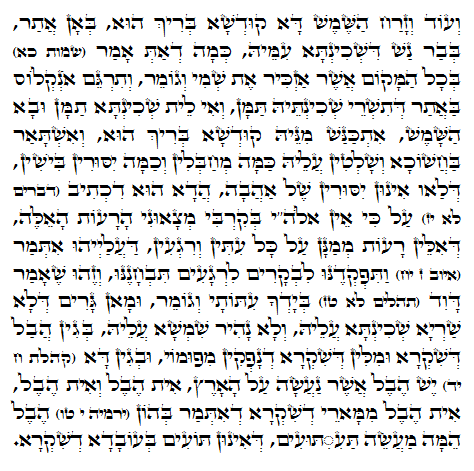Daily Zohar – Tikunim – # 844 – Suffering of love
Click here to listen to the Daily Zohar [audio:https://dailyzohar.com/wp-content/uploads/audio/dz844.mp3|titles=Daily Zohar 844]

Hebrew translation:
Tikkun 69 – 84
Ecclesiastes 1:5
“וְזָרַח הַשֶּׁמֶשׁ, וּבָא הַשָּׁמֶשׁ; וְאֶל-מְקוֹמוֹ–שׁוֹאֵף זוֹרֵחַ הוּא, שָׁם”
“The sun also ariseth, and the sun goeth down, and hasteth to his place where he ariseth.”
The Zohar brings another explanation to this verse.
‘The sun arise’ is the Holy One, Bless be He that comes to a person who has the Shechinah within him.
If the Shechina is not with the person, then the light is hidden from him in the aspect of ‘the sun goes down’. This is a state of suffering and chaos and that is not suffering of love.
Deuteronomy 31:17
“וְאָמַר, בַּיּוֹם הַהוּא, הֲלֹא עַל כִּי-אֵין אֱלֹהַי בְּקִרְבִּי, מְצָאוּנִי הָרָעוֹת הָאֵלֶּה ”
“they will say in that day: Are not these evils come upon us because our God is not among us?”
We already know that when we follow the ways of the Light, we enjoy his beneficent but the Zohar distinguishes between sufferings and another kind ‘that is not suffering of love’.
So we understand that there are two kinds of sufferings. One is chaos and darkness and the other one is ‘suffering of Love’.
Deuteronomy 31:18
“ וְאָנֹכִי, הַסְתֵּר אַסְתִּיר פָּנַי בַּיּוֹם הַהוּא, עַל כָּל-הָרָעָה, אֲשֶׁר עָשָׂה: כִּי פָנָה, אֶל-אֱלֹהִים אֲחֵרִים”
“And I will surely hide My face in that day for all the evil which they shall have wrought, in that they are turned unto other gods.”
Exodus 33:23
“וַהֲסִרֹתִי, אֶת-כַּפִּי, וְרָאִיתָ, אֶת-אֲחֹרָי; וּפָנַי, לֹא יֵרָאוּ.”
“And I will take away My hand, and thou shalt see My back; but My face shall not be seen.”
There are two aspects to the ways God is ‘hidden’ from us. One is a complete concealment where we are left alone to forces of darkness and getting out of it requires great effort.
The other aspect is seeing only the ‘back’ of God. This is the aspect of the vessel that we need to create in order to reveal light. It is a state of work and hardship that is the process of Tikkun. The sufferings that we have at this state are given to us with love from God so we can grow and increase our vessel.
A butterfly is locked in a cocoon and must fight to get out of it. If we help by releasing him from his lock, the butterfly will not be able to open his beautiful wings and fly.
A chick in the egg needs to make a great effort to peck out of the hard shell that surrounds it. This process teaches the tiny chick the power of his peck for eating and fighting away other chicks. Needless to say that if we want to be good and ‘help’ in shortening the process, we may kill the bird.
In this life we are inside a shell and we can not see the light. We have to work hard to better our souls and increase our vessels. It is the only way to enjoy greater light that will be available to us in the next world or at the time of Mashiach and the Final Redemption.
Proverb 13:24
“חוֹשֵׂךְ שִׁבְטוֹ, שׂוֹנֵא בְנוֹ; וְאֹהֲבוֹ, שִׁחֲרוֹ מוּסָר’
“He that spare his rod hate his son; but he that loves him chasten him betimes”
Reading recommendation: Proverb 2
{||}

 Previous: Tikunim
Previous: Tikunim
